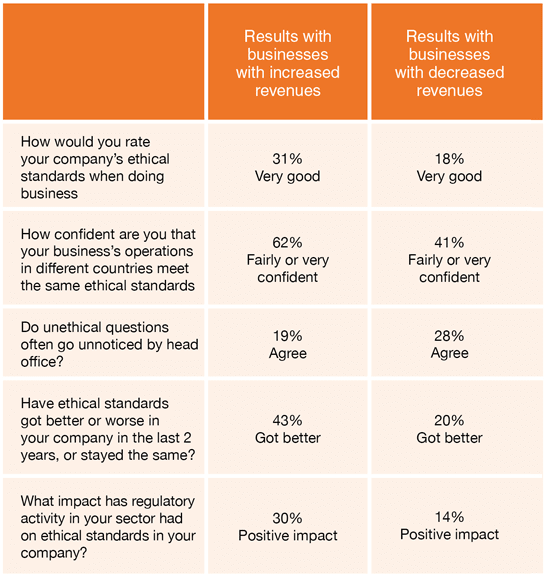The case for ethical sales behaviour
28th January 2016 | Ian Helps

Table 1: The link between ethical standards and business performance
Ethics is the foundation stone for trust between sellers and buyers. A core task for all sales professionals is to ethically balance responsibility to shareholders with a duty of integrity towards customers.
At work, sales professionals are much more likely to be driven by following rules than in their personal lives. Rules are an insufficiently robust mechanism to guide behaviour in times of difficult choices. This therefore exposes companies to the risk of mis-selling, product misplacement and, in extreme cases, fraud.
The Association of Professional Sales (APS) has been established as a not-for-profit professional body to represent the sales profession. The APS is putting the infrastructure, governance and ethical foundations in place that will put sales on a par with more established professions such as accounting, law, and medicine. Ethics and standards in sales lie at the core of the APS mission: the association is determined to demonstrate and promote the fact that good ethics is good business in sales, as it is for any of the other more-established professions.
Lack of discussion and research
It is perhaps surprising how little discussion there has been on ethics in sales amongst practitioners; moreover, there is insufficient research on the business case for ethics in a sales context – both in avoiding the major risks that unethical behaviour poses to business and the positive contribution an ethical outlook can make to sustained business growth.
The APS therefore decided to establish a group of its founding members to focus on the task of defining ethical sales practices and to put in place defined standards of professional practice.
I am honoured to lead this group, which includes a group of committed individuals, representing some of the world’s leading organisations, including: Barclays, EY, Pepsico and SAP, which are spearheading this cause. Our first need is to establish the case for ethical selling. We have been proud to work closely with experts from EY in building a white paper Ethical Decision Making in Sales, which we have recently published.
To quote David Rutherford, a director at EY who championed the development of the white paper: “We see a clear need for sustained focus upon ethical standards within broader corporate purpose to ignite long-lasting, positive change within the sales community, enhancing levels of trust in the light of various marketplace issues such as PPI and door stepping.”
The white paper demonstrates that there is a positive case to be made. The key premise is simple: organisations that purposefully exhibit and operate with integrity and make ethical business decisions continue to be performance leaders. These organisations:
- have better reputations;
- have better employee commitment to ethical practice;
- have systematic approaches to ensuring ethical business decisions; and
- are much more likely to be growing businesses.
Reputation
As the paper makes clear, organisational reputation is paramount. A study of the S&P 500 estimated that 84% of the companies’ market values was related to intangible factors like brand equity. By contrast, in 1975, that figure was only 17%. This makes organizations ever more vulnerable to anything that may damage the perception of their external and internal stakeholders.
Table 1 makes the case strongly for employee commitment to ethical practices. Put simply, employee engagement that builds strong ethical foundations results in increased revenues.
The EY Fraud and corruption survey also found that in organisations with increasing revenues, 50% of employees would feel supported in reporting ethical concerns versus only 30% in companies with decreasing revenues. This reinforces the need for companies to be systematic with their approach to ethical practices. Whilst there will always be a temptation to go for the “quick buck”, if we consistently and rigorously prove the business case for ethical selling, executive management and, in turn, sales leadership will increasingly come to see it as a critical value, to be advocated and driven hard in their own organisations.
Evidence bank
The APS is also building an evidence bank of how ethical selling is good business, which we summarise as “how doing the right thing delivers the right results”. We have already assembled a number of examples and will collect many more, to show this case overwhelmingly. For example, at our APS Ethics in Sales event, Toshiba TEC UK shared how the organisation has dramatically increased sales performance by focusing on driving a values-based culture of integrity and customer-centricity.
Our first step has been the publication of the white paper, through which we hope to generate a dialogue on ethical selling and to find others who choose to join us on the journey.
Our second step has been to publish an APS Sales Code of Behaviour1 and to seek consultation on it. We have enshrined the code in six underlying principles. Once finalized and adopted, it will commit our members to:
- Ensure appropriateness and accuracy of solutions provided to customers
- Maintain the highest standard of integrity in all business relationships
- Promote the eradication of unethical business practices
- Enhance and protect the standing of the profession
- Enhance the proficiency and stature of the profession
- Ensure full compliance with laws and regulations
Three intentions
We have three broad intentions for the code. Firstly, the code will provide a renewed basis for discussing how integrity within sales organisations is translated in practice into a culture of “doing the right thing and getting the right results”. The APS is establishing an implementation support framework for organisations, both large and small, to conduct this conversation, using Professor Steare’s robust MoralDNA2 framework as a guide.
Secondly, it will provide a third-party and neutral reference for buyers and sellers, and a first line of defence for the parties involved. For sales professionals, it provides a degree of protection against being asked to sell unethically, providing a reference against which to discuss sales integrity. Similarly, it provides a degree of protection to customers, who can be assured that APS members will abide by the code, with the ultimate sanction that should an APS member not do so, the APS is establishing the necessary processes to ensure that there are sanctions in place in the event of code transgressions.
Thirdly, the code underpins the APS’ development of a robust curriculum to accredit the sales professionals of the future, as the APS works towards seeking chartered status for sales.
Given the clear direction of travel by customers worldwide, who expect a better and more ethical sales experience, we invite other organisations and individuals to join us. Of course, turning the “super tanker” on this subject is something that will take vision, commitment, and a lot more hard evidence. The good news is that the journey has begun and we welcome others, especially those in sales leadership positions, who would like to join us on it.
1 Readers can view a copy of the Draft APS Sales Code of Behaviour here: http://associationofprofessionalsales.com/wp-content/uploads/APS-Sales-Code-of-Behaviour-v1_2-091115.pdf.
2 Editor’s note: Professor Steare is co-designer of the psychometric profile MoralDNA, used to measure moral values, along with Pavlos Stamboulides, director of Psycholate.


